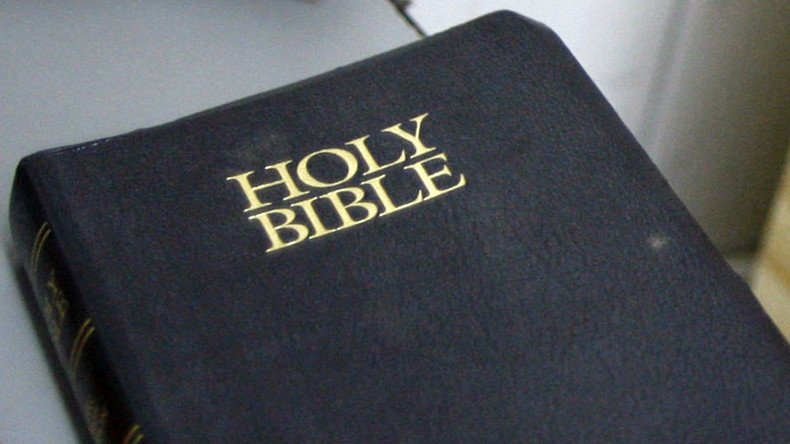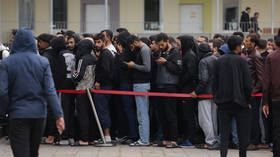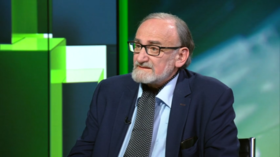Russian man may face jail for insulting Orthodox faith online, case ‘creates dangerous precedent‘

Public opinion in Russia is divided over the case of a man who could spend a year behind bars for insulting the feelings of religious believers when in an online debate he said the Bible is “complete bulls**t” and “there is no God.”
Viktor Krasnov, from Stavropol in southern Russia, opened up a Pandora's box in 2014 when he decided to share his atheist views on the Vkontakte social network, doing so in quite harsh terms. “If I say that the collection of Jewish fairytales entitled the Bible is complete bulls**t, that is that. At least for me,” Krasnov wrote, adding fuel to the fire by saying “there is no God.”
One of the people taking part in the online dispute lodged a complaint against Krasnov, accusing him of “offending the sentiments of Orthodox believers.”
A criminal case was opened in 2015, and Krasnov even spent one month in a psychiatric ward last year, undergoing examinations before he was finally deemed to be sane. He is currently being prosecuted under a 2013 law introduced after members of the punk group Pussy Riot were jailed for their controversial performance in Moscow’s main cathedral.
Krasnov’s lawyer told AFP that his client was “simply an atheist” and had taken aim at both “Halloween and Yiddish holidays” in the same exchange.
“Blasphemy laws – the laws designed to protect religions from offense – are not uncommon worldwide or in Europe,” Ben Ryan, an expert from Theos, a thinktank working in the area of religion, politics and society, told RT.
God a terrorist? Vatican newspaper slams Charlie Hebdo cover https://t.co/K672zyq1fDpic.twitter.com/mhvKCobGgi
— RT (@RT_com) 6 января 2016 г.
“Similarly, there are other laws, like in the UK, which will prevent you from religiously aggravated harassments,” he added, recalling that in one of the most famous cases four men were jailed in the UK in 2014 for throwing a pig's head into a mosque in the aftermath of the murder of Lee Rigby.
“I think it's particularly sensitive with the Orthodox Church in Russia because there are so many Orthodox Christians. It's not so long since people remember the repression of the Orthodox Church under the communist regime,” Ryan noted.
The problem is, you never know “who is going to get insulted by what,” Sergey Brun from the Museum of Russian Icons told RT, adding that we are “definitely in need of a council of competent theologians, lawyers that would be able to settle such disputes and prevent court cases like this.”
He says Krasnov's case deserves immense attention and coverage because it “creates a unique and dangerous precedent for Russia.”
“It's not about the fight between religion and the freedom of speech, or vice versa. We rather see an initiative, brokered by people who identify with a certain religious movement, and their attempt to import a verbal tussle, whether it's well reasoned or not, from a social media blog to a court issue. It's an attempt to shut up your opponent on the grounds that he or she insults your feelings. The problem is, if a court rules out that these claims are in fact legitimate, we risk witnessing not just clashes between agnostics and some traditional or non-traditional schools, we'll see, for example, different branches of the Orthodox religion arguing with each other in court. Take the recent meeting between Pope Francis and Patriarch Kirill in Cuba – remember what the reaction was on social media platforms. Some saw it as an important step towards unity, others wrote angry comments,” Brun said.
‘Bring back blasphemy laws, apply them equally to all faiths’ - Keith Vaz https://t.co/WiBoxPfTKqpic.twitter.com/m3vkKdNZBD
— RT UK (@RTUKnews) 16 ноября 2015 г.
“If I enter a church, mosque, a synagogue, or simply a club where a conference of agnostics takes place and start screaming against them or insulting them, that is a problem, that's an attempt to insult someone,” Brun said. “But such spheres as social media, open conferences, platforms for communication between people, have to have quite a wide range of liberties,” he added.
Last month Albert Voss, a 66-year-old retired teacher in Germany, was convicted of blasphemy after he "spiced up" the rear window of his car with anti-Christian slogans. “The church is looking for modern advertising ideas. I can help,” one read, according to the Telegraph. “Jesus, our favorite artist: hanging for 2,000 years and he still hasn’t got cramp,” another reportedly went on to suggest. Voss was fined €500 (US$550) for defaming Christianity.
In 2006, a German court gave a one-year suspended jail sentence to a man who printed the words "The Holy Koran" on toilet paper and distributed the rolls to local mosques and newspaper offices.
In 2012, Maltese courts convicted 99 individuals for public blasphemy, Malta Today reported, adding that Maltese law prohibits vilification of or giving offense to the Roman Catholic Church, Malta's official religion.













